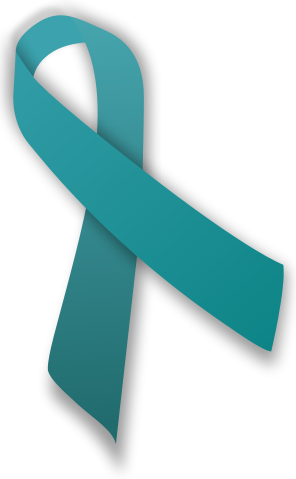Ovarian Cancer Statistics In Australia
Every year, around 1400 women are diagnosed with ovarian cancer in Australia. Making it the eighth most common cancer diagnosed in Australian women. Ovarian cancer has a 5 year survival rate of just over 45%[1]
What is ovarian cancer?
The ovaries are oval-shaped glands that sit on either side of the uterus inside a woman’s pelvis. They are responsible for the production of the female sex hormones progesterone and estrogen, and also release an egg each month as part of the reproductive cycle.
Historically it was thought that this malignancy develops in the ovaries. However, it is now understood that the fallopian tubes, which allow the eggs to travel from the ovaries to the uterus, is an important potential site of development. Wherever the cancer originates from, it can spread to other parts of the body, if left untreated. The term ovarian cancer is still widely used, to cover any malignancy that develops within the ovaries or fallopian tubes.
Common types of ovarian cancer
The vast majority arise in the cells that cover the fallopian tubes or ovaries, these are classed as epithelial ovarian cancers[1]. The most common types of these are:
- High-grade Serous Carcinoma- is the most malignant form of ovarian cancer and accounts for up to 70% of all ovarian cancer cases.
- Clear Cell Carcinoma- is the second most common subtype and accounts for about 10-13% of women diagnosed with ovarian cancer
- Endometrioid carcinoma- is the third most common subtypes. It is commonly diagnosed at a low stage and is commonly low grade.
- Mucinous Carcinoma- accounts for 4% of ovarian carcinomas
Ovarian cancer symptoms
Ovarian cancer can be difficult to diagnose in its early stages, largely because symptoms are often vague and similar to those caused by a number of other medical factors.
Symptoms also vary depending on the stage of the cancer. Someone with early stage ovarian cancer may experience some pain in the lower abdomen, and dismiss it as a digestive issue such as bloating.
In its later stages, ovarian cancer can cause symptoms that include:
- Pain, bloating and/or a feeling of pressure in the abdomen
- Indigestion or stomach pain
- Difficulty eating or feeling full quickly
- Constipation or diarrhea
- Vaginal bleeding unrelated to normal menstruation
- Pain during sex
In very advanced stages, women may experience severe abdominal pain, nausea, loss of appetite, and/or extreme lethargy.
It’s important to remember that these symptoms are attributed to a number of other factors, and aren’t necessarily a sign of cancer. However, if you’re experiencing any of these symptoms, it’s best to visit your GP to get checked out.
Risk factors of ovarian cancer
There’s no clear cause of ovarian cancer. That being said, a number of factors have been identified that may influence its development. These include:
- Ageing (women over 50 are at increased risk)
- Having first degree relatives (parent, sibling, or child) with a history of ovarian, breast or bowel cancer
- Genetics (inheriting the gene BRCA1 or BRCA2)
- Having your first child after 35 (or not having a child at all)
- Starting periods early (before 12 years) and late menopause
- Being of Ashkenazi Jewish descent
- Never having taken the contraceptive pill

Diagnosing ovarian cancer
There is currently no screening test available for ovarian cancer. If you have symptoms of ovarian cancer, your GP may suggest several tests to look for tumours or other changes. These tests can include:
- Physical examination to check for masses or lumps
- Blood tests to check for the tumour marker protein CA125
- Imaging scans including ultrasound, CT or PET scan
If these tests indicate any abnormalities that need to be investigated, a tissue sample is taken (biopsy) so the cells can be examined under a microscope.

Staging and grading of ovarian cancer
A common classification system known as FIGO (International Federation of Gynaecology and Obstetrics) is used to indicate the extent of the cancer. Your oncologist uses it to help them recommend the most suitable treatment plan for you.
Stage I: Cancer is contained in one or both ovaries.
Stage II: Cancer is in both ovaries and has spread to other pelvic organs.
Stage III: Cancer is in both ovaries, and has spread beyond the pelvis to the lining of the abdomen or lymph nodes.
Stage IV: Cancer has spread to distant organs (such as lungs or liver).
Grade 1: Cancer cells look similar to normal cells and are growing slowly.
Grade 2: Cancer cells look slightly abnormal and might be growing rapidly.
Grade 3: Cancer cells appear very different from normal cells, and are growing rapidly.
Ovarian cancer treatment
Treatment depends on the cancer’s stage and grade. Surgery is used to determine the extent of the disease, and is the main treatment if it’s localised. If the cancer has spread, your oncologist will try to remove as much of it as possible during the surgery.
Surgery is usually followed by chemotherapy to try and eliminate any remaining traces of the disease. If the cancer is widespread, chemotherapy may be used before surgery as well.
Radiation therapy is sometimes also used to treat other sites if the cancer has spread. It can be used on its own, or in partnership with chemotherapy. Some new targeted therapy drugs are also being offered to women with a BRCA gene mutation.
Your oncologist takes into account a variety of factors, including your cancer stage and grade, as well as your general health and lifestyle when working out a treatment plan. They will then explain your treatment options, and discuss the most suitable treatment course for you.
What to expect at your first appointment
At Hunter Valley Oncology, we understand that an ovarian cancer diagnosis can be frightening.
After being referred to our Maitland or Newcastle cancer clinic by your GP, we’ll help you gain a clear understanding of your diagnosis and treatment options. Our compassionate oncologists aim to give you the guidance and care you need to feel supported throughout your cancer journey.
At your first consultation, we will review your medical history (including your immediate family), so we recommend bringing some notes with you. Your oncologist will also need a list of your current medications.
Once your diagnosis and treatment plan are clear, your treatment will begin at a centre located conveniently to you. Our doctors treat patients at the Newcastle Private Hospital, and the Lake Macquarie Private Hospital, in the Newcastle and Hunter region. See our locations for more details.

To make an appointment or for more information, contact Hunter Valley Oncology.
